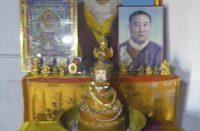
High Peaks Pure Earth has translated a blogpost by Woeser, originally written for the Mandarin service of Radio Free Asia in August 2018, and published on her blog on September 22, 2018.
In this piece, Woeser remembers her travels through East Turkestan (Xinjiang Uyghur Autonomous Region in Chinese) in 2003 but, as she alludes to, the situation there has acutely worsened since. In particular, details started to emerge earlier this year about the network of Reeducation Camps set up in the region. The work of scholars, human rights organisations and journalists have uncovered hard evidence of the expansion of the camps and mistreatment of Uyghurs all under the tight grip of Party Secretary Chen Quanguo – relocated from his post as Party Secretary of Tibet Autonomous Region.
Woeser’s husband Wang Lixiong has been a close watcher of East Turkestan for almost 20 years and in 2007 published a book titled “My West China, Your East Turkestan”, read an extract from that book in English on China Change here. The last paragraph of the article refers to Woeser’s own short story Nyima Tsering’s Tears that was published in her book “Notes on Tibet”.
Finally, for unfolding information about the current situation in East Turkestan, follow on Twitter (among others) Adrian Zenz, James Leibold, Rian Thum and Darren Byler.
“East Turkestan Through the Eyes of a Tibetan”
By Woeser
Many memories are scattered across the series of articles titled “East Turkestan Through the Eyes of a Tibetan” that I wrote 15 years ago. But many memories are fragmented. Back then, I took photos and notes along the whole journey. It was only a 13-day-long trip but I managed to visit most of the places in the south, also known as Nanjiang (South Xinjiang): Turpan, Keriye, Khotan, Karakash, Qaaghiliq, Yeken, Yengisar, Kashgar, Maralbeshi, Bay, Kuchar, Chaqiliq… All these Uyghur names are unforgettable. But my records are not complete, or rather, I had only written half before there is an abrupt end. Originally, I thought I would later come back and add to what I have. I wanted to especially go to the places I had not been to, like Urumqi and other areas in the north. I never thought that my first trip to East Turkestan in 2003 would very likely also be my last. And this is not because I myself would not be able to go. It is because of the developments in East Turkestan. In 2009, after Wang Lixiong published his book “My West China; Your East Turkestan”, he always wanted to take me there again but our friends there always advised us not to, saying that recent developments are not good, to wait and see later. So we waited until today. And it is all too well-known that nothing has been changing for the better; on the contrary, things are getting even worse. We haven’t heard anything from our friends in a very long time.
And so, when I went back to the series I wrote about my travels through East Turkestan for Radio Free Asia, I also especially dug out the published photos that I had taken of Uyghur children in Kashgar. I looked at each one of them and felt anxious. 15 years ago. These boys and girls have all grown into young adults, but are they well? Have they also been evicted and subjected to the fate of old Kashgar that was “modernised”? All I can do, being so far away from them and their world, is to harbour empty worries. A few days ago, when German media wanted to interview Wang Lixiong about East Turkestan, he had to regretfully tell them that he had not been back for 12 years and that, being so closed off, it was impossible to really know anything about the current situation in East Turkestan and that it would be irresponsible to prematurely comment on it.
What I would like to convey in this little essay is that there is a reason why my series of essays back then was only fragmented. In fact, it is a personal reason. More precisely, it was related to the censored book “Notes on Tibet” that I published in 2003. Yes, I saw that exact book in a Xinhua bookstore in Kohtan. For someone who had only published two books, this was a great encouragement and made me extremely happy. But why only one book? Had it sold so well? The shop assistant told me that it had already been the second batch, but each batch only consisted of five copies. Did this mean that I had nine close friends in Kohtan? Well, I left it to Diniyar to become the tenth. I paid and had the “Kohtan Xinhua Bookstore” red stamp put on the last page of my book as a souvenir. Diniyar said: “Ha, a Tibetan who writes in Chinese.”
After I came back from East Turkestan, I was subjected to a life under the influence of the censored book “Notes on Tibet”, a life that was characterised by sly, yet unbelievable disturbances. This is why I could never complete my writings about my travels through the southern areas of East Turkestan. This state lasted for an entire nine months. Only in June 2004, things got back to normal. But I was fired from my position of editor of “Tibetan Literature” because of the two books. Wang Lixiong wrote in an essay from the Summer of 2004 entitled “Tibet Facing Imperialism of Two Kinds: An Analysis of the Woeser Incident”:
“… ‘Notes on Tibet’ is an anthology of Woeser’s prose writing, which was first published in 2003 by Huacheng Publishing House in Guangzhou. While the book was popular, and soon went into a second print run, it also attracted the attention of the censors. At first, the United Front Department of the Chinese Communist Party considered the book to have made ‘serious political mistakes.’ This accusation was followed by the demand from those in charge of ideological work in Tibet to examine the book. At the same time, its sale in the TAR was banned. Finally, the Bureau of Journalism and Publication of Guangdong Province was ordered to completely ban the book.
The TAR Literature Association, the work unit to which Woeser used to belong, concluded its comments on Notes on Tibet by writing: ‘It exaggerates and beautifies the positive function of religion in social life. Individual essays convey the author’s faith in and reverence for the Dalai. Certain contents reveal a rigid thinking on nationalism and opinions that are harmful to the unification and solidarity of our nation. Some of its contents render the great achievements of Tibet Reform in the past decades invisible; meanwhile, it indulges in nostalgia for the old Tibet without tangible examples. The book appears to have made false value judgments and divorced itself from the correct political principles; the author has abandoned the social responsibility that a contemporary writer ought to have and lost her political commitment towards the progressive civilization movement.’
Shi Jifeng, Deputy Director of the General Bureau of Journalism and Publication in China, outlined the official charges against Notes on Tibet in a business meeting: ‘The book praises the XIV Dalai Lama and the XVII Karmapa, and it encourages reverence to, and belief in, religion. These are serious mistakes in the author’s political stance and her point of view. Some of the chapters have, to a certain degree, stepped into the wrong political terrain. For instance, in ‘Nyima Tsering’s Tears,’ the author depicts the confusion that the famous religious figure Nyima Tsering had when he encountered the supporters of the Dalai in an international conference. It reflects that the author is not clear about the essence of the Dalai’s splittism and promotion of Tibetan independence. Also, chapters such as ‘Tenzin and His Son’ reveal her misunderstanding of the history of the Sino-Tibet conflict in the 1950s. (Publication Newsletter 22; posted on www.intelnet.com at 02/23/2004)’”
“…Woeser happened to be in Beijing attending an advanced seminar on journal editing at the Lu Xun Literature Institute when the ban was imposed on ‘Notes on Tibet’. Prior to the incident, the TAR Literature Association was considering promoting her to vice editor-in-chief of Tibetan Literature. However, as soon as the book got into trouble, her study was immediately suspended. She was summoned back to Lhasa. A ‘Helping and Teaching Group’ was organized for her ‘education in thinking.’ She was asked to ‘examine’ and ‘jump the hurdle.’”
“…Until now, Woeser has been punished: 1. In the name of voluntary resignation, she was removed from her post in the TAR Literature Association and deprived of her income. 2. The housing assigned to her has been confiscated; she now stays temporarily with her mother. 3. By the suspension of her medical and retirement insurance she is left with no social security. 4. She is restricted from applying for a passport to leave the country. So, in spite of not being thrown into prison, she has been deprived of everything that can be taken away from her.
For people living in free societies or in today’s inland China, the significance of this kind of punishment to Tibetans might not be clearly understood. Society within inland China has now diversified into different options. There are enough opportunities beyond the official system to allow many people to survive and prosper without dependence on the system. In contrast, the modernising of Tibet and its society has been structured to completely rely financially on Beijing. There is no real social stratification there. With the monastic sector as the sole exception, nearly all other kinds of cultural workers and intellectuals have been entirely recruited into the system. In other words, only when inducted as a part of the system can one have a chance to become a professional working in the fields of culture; otherwise, there is even no guarantee of basic survival.
I had been puzzled that while dissenting intellectuals were active in the public sphere in the previous Soviet Union and Eastern Europe, and are now in inland China, this has not been the case in Tibet, despite the suffering Tibetan people have experienced, the international support they have received, and the fact that they have the spiritual leadership. Why have we so far only heard about the quiet resistance from the monastics or at a very grassroots level? I think one important reason for this is Tibetan intellectuals’ lack of space to survive outside the system. The system therefore retains the power of deciding an individual’s life and death. The system that feeds all of the cultural professionals is also the system that disciplines all of them. When one is scared by the system, there is no chance to be against it. The current suppression of Tibetan culture is carried out through this kind of control from within the system. To punish Woeser is to send out an alarm to the rest.”
Wang Lixiong describes in his quotes what I experienced, but for me, this now belongs to the past. In fact, it is a kind of relief. I managed to break away from working within the system and obtained a kind of spiritual relief, making me a genuinely independent writer. This has certainly been the most important turning point in my life. But because of my persistence in writing about the truth, my life and identity have changed as the world has. Just as Herta Müller said in her speech when receiving the Nobel Prize in Literature: “I talked a great deal during the dictatorship, mostly because I decided not to blow the trumpet. Usually my talking led to excruciating consequences. But the writing began in silence…” Or as Norman Manea wrote in his book “On Clowns: The Dictator and The Artist”: “I am not the ‘political dissident’ that people believe me to be… I just want to be a writer in a normal society and ‘live under the truth.’”
Finally, I want to write a slightly different conclusion. But it is still related to “Notes on Tibet”. As I said, on my travels through the southern areas of East Turkestan, I bought the last one of my books at the Xinhua bookstore in Kohtan and gave it to my Uyghur friend. He later wrote me an email using his not so good Mandarin, in which he wrote:
“I am now reading your book, when Nyima Tsering was in Norway and the little girl had finished talking, I felt really sad; I couldn’t control myself, I naturally started to cry. I read it a few times. And when he answered the little girl’s question, I never thought that I would burst out in tears. I cried for a long time. It was like something was really squeezing my heart; I have a bad and weak heart, I really couldn’t take it. I really want to shout out… but unfortunately I don’t have the courage. I am so so pathetic compared to Nyima Tsering.”
Lhasa, August 2018





Follow Us!